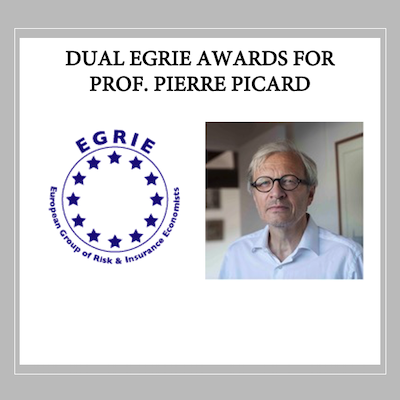

During the last EGRIE seminar which occurred in Malaga, Spain between September 17 and 20, 2023, Pierre Picard, Polytechnique emeritus professor and researcher at CREST received two awards for his publications.
European Group of Risk & Insurance Economists – EGRIE
EGRIE is a European based non-profit organization dedicated to promoting research on risk and insurance. This is mainly achieved through the organization of scientific conferences and meetings, the publication of research materials and the creation of a contact network amongst the concerned parties.
Professor Pierre Picard
Prof. Pierre Picard, professor of Economics at Polytechnique and researcher at CREST, is best known for his contributions to the study of insurance economics and risk management. Prof. Picard’s research has consistently challenged and reshaped conventional economic wisdom.
His work delves deep into the intricacies of insurance markets, shedding light on their functioning, competition dynamics, and implications for policy making.
A dual EGRIE award for Prof. Picard
During the 50th EGRIE Seminar, last September, Prof. Pierre Picard was recognized with two different awards for his publications:
- SCOR-Geneva Risk and Insurance Review Best Paper Award
Prof. Picard and his coauthors obtained the SCOR/TSE-P award for the best paper of the year published in the Geneva Risk and Insurance Review
Parametric insurance and technology adoption in developing countries, Enrico Biffis, Erik Chavez, Alexis Louaas, Pierre Picard, Geneva Risk and Insurance Review, 47(1), March 2022, 7-44
The paper investigates how parametric insurance can contribute to improving access to finance, and hence to technology, for smallholder farmers. In a model with moral hazard, it demonstrates that bundling parametric insurance with loans may lower collateral requirements, thus promoting the financial inclusion of poor households. The case of agricultural input loans and weather-index insurance is studied in detail and related to bundled finance solutions recently piloted among smallholder farmers in Tanzania.
- The Harris Schlesinger Prize for Research Excellence
This Prize is dedicated to the memory of Harris Schlesinger, a founding Editor of the Geneva Papers on Risk and Insurance Theory (now the Geneva Risk and Insurance Review) and a past President and avid supporter of the European Group of Risk and Insurance Economists. The Harris Schlesinger Prize for Research Excellence is to be awarded to an outstanding article published in the Geneva Risk and Insurance Review during the previous ten years.
Participating Insurance Contracts and the Rothschild-Stiglitz Equilibrium Puzzle, Pierre Picard, Geneva Risk and Insurance Review, 39(2), September 2014, 153-175
In this article, it is shown that an equilibrium always exists in the Rothschild-Stiglitz insurance market model with adverse selection when insurers can offer either non-participating or participating policies, i.e., insurance contracts that may involve policy dividends or supplementary calls for premium. The equilibrium coincides with the Miyazaki-Spence-Wilson equilibrium, which involves cross-subsidization between contracts within subgroups of individuals. The paper establishes that participating policies act as an implicit threat that dissuades deviant insurers who aim at attracting low-risk individuals only. The model predicts that participating policies act as an implicit threat that dissuades deviant insurers who aim to attract low-risk individuals only. The model also predicts that the mutual corporate form should be prevalent in insurance markets or submarkets where second-best Pareto efficiency requires cross-subsidization between risk types. Stock insurers and mutuals may coexist, with stock insurers offering insurance coverage at actuarial prices and mutuals cross-subsidizing risks.
I am text block. Click edit button to change this text. Lorem ipsum dolor sit amet, consectetur adipiscing elit. Ut elit tellus, luctus nec ullamcorper mattis, pulvinar dapibus leo.
Source: http://egrie.org/awards-grants

